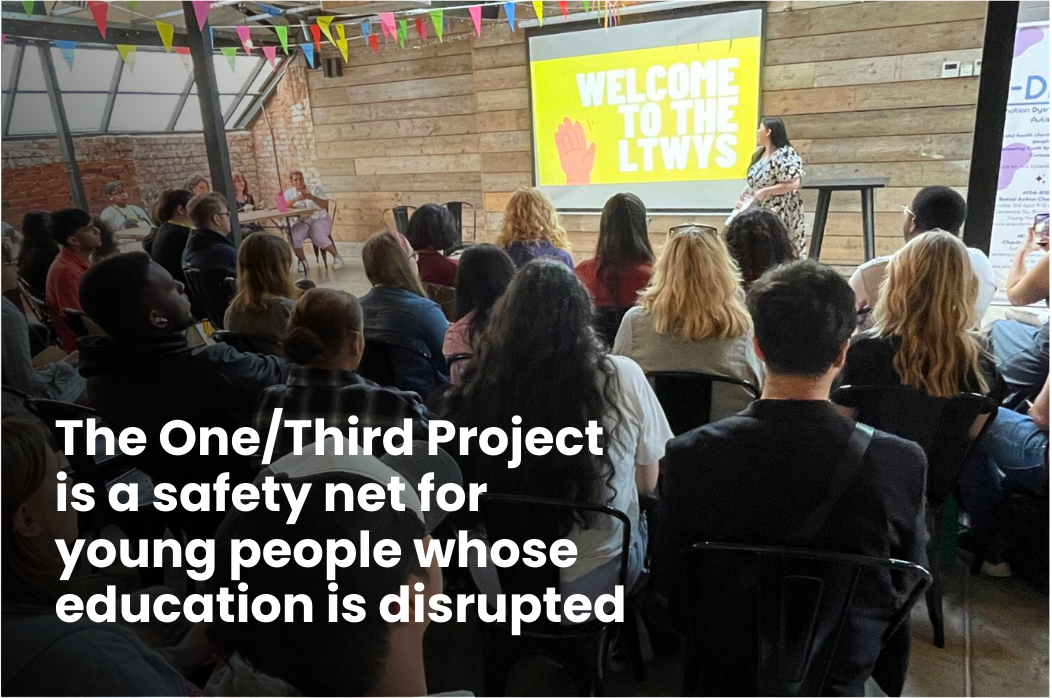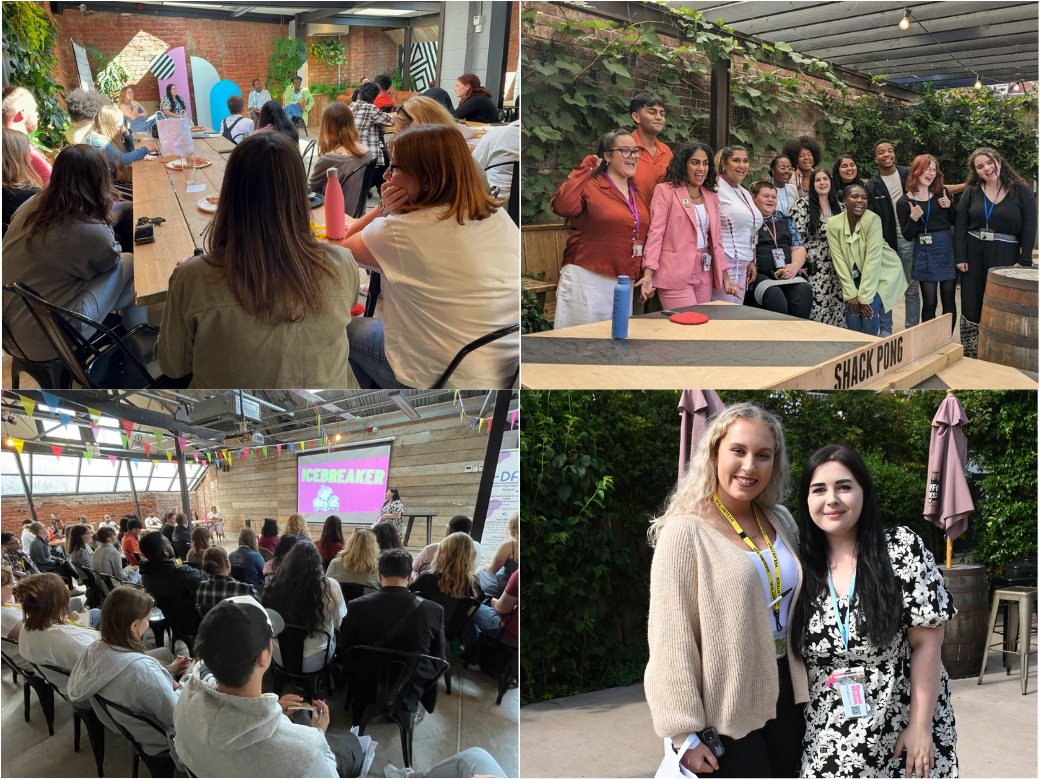
Rooted in the vision of resilience and forged from personal experiences, Hannah Walton, the driving force behind The One/Third Project, has spearheaded an initiative that speaks directly to the challenges faced by young people aged 16-25.
In the world of educational uncertainties and disruptions, Hannah Walton’s initiative, The One/Third Project, emerged from an urgent need to address the gaps faced by young individuals during trying times in their education. Her late-night spark of inspiration and unwavering drive led her to create a support network she wished had existed during her own mental health challenges, disrupting her education journey.
Hannah Walton’s journey is a testimony to the unspoken struggles faced by university students grappling with mental health issues. Reflecting on her own experience, Hannah recalls a time when health challenges forced her to drop out of university, a decision deeply intertwined with mental health issues and the lack of adequate support. Her earlier departure from secondary school due to anxiety sensitised her to the insufficient assistance available to early school leavers—often contingent upon location and academic achievements.
Recognising the shared struggles faced by many in her age group, Hannah resolved to carve a path that others could tread as well.
“If I could figure this out and make it work for me, then maybe it could work for others too,” says Hannah. “It was very spur of the moment. My brain just works better between twelve and four in the morning regardless of how tired I am. I’ll suddenly wake up at that time and start doing essays and whatever I need to get done and then, obviously, I’ll try to schedule my emails to make it look like I’m not awake at that time!”
At the time, an article published in the Guardian had been playing on Hannah’s mind for over a year. It reported that a third of university students who dropped out were doing so because of their mental health.
“When I was at university doing an undergraduate degree in Law and Criminology, I got quite a severe kidney infection and ended up being unable to do my assignments,” says Hannah. “The university was quite strict about deadlines and so I ended up dropping out. Although I’d dropped out because I’d had a kidney infection and was in and out of hospital, my mental health was a massive part of that. I was already struggling and didn’t feel that I could get the support there.”
Hannah had previously left secondary school at 14 due to severe anxiety, and she already knew that there was little support available to early school leavers. Often, she found that she was ineligible because access to the support was contingent upon postcodes and good grades. Other initiatives only provided support in exchange for a fee.
“I thought, I don’t know any other people going through this, but I surely can’t be the only one,” says Hannah. “How can I help other people navigate it as well? I felt like if I could do the heavy lifting of research and figuring stuff out and if I can create something that works for me, maybe it will work for other people.”
The One/Third Project was born from humble beginnings, sparked by a small win in a radio competition that kickstarted it’s creation. Overnight, Hannah pieced together a website and began reaching out through social media, igniting a movement that gained swift momentum.
“I spent all night doing it, came up with the logo and started posting on social media to see if anyone was interested,” recalls Hannah. “The idea was to get some feedback and support going and then to build all the services that we could offer. I was genuinely shocked when it took off very quickly.”
Hannah was inundated with support from organisations and other young people with similar experiences, and she was featured in the local newspaper just a month later. This collective energy moulded the services The One/Third Project offered, emphasising peer mentorship, social engagement and action, and guidance for young people navigating education outside the formal system and she has since incorporated a CIC.
“Youth voice is the catalyst igniting change, propelling us towards a future where every perspective matters and every idea holds the power to shape our world.”
To say that Hannah has made an impact is an understatement. Within months, she received nominations at the National Diversity Awards, the Women’s Awards West Midlands, the ‘Community Unsung Shero’ NBCC Award and the Mental Health Blog Awards. Within a year, she had spoken to 900 students about their mental health and co-designed two projects with young people. She has been featured on ITV News, Times Radio and more awards and nominations have followed since.
Behind the scenes, sustaining the project while managing personal responsibilities became a challenge. The pivotal support from the Challenge and Change Fund provided a lifeline, ensuring the continuity of the Project.
With enhanced support, The One/Third Project expanded its offerings to provide tailored mentoring for university and A-Level students. The focus shifted to impactful social initiatives addressing critical issues such as mental health, education, climate change, and social justice.
Social action emerged as a transformative force in Hannah’s life, helping her battle anxiety and regain confidence. It became the driving force attracting more individuals to The One/Third Project, resulting in inspiring success stories of participants engaging in volunteer work abroad, securing prestigious university placements and receiving awards.
“Without me realising, social action was something that helped me the most,” she says. “I was stuck in my house for two years from anxiety and volunteering was the only thing that got me out of that. I slowly started to get into social action and that was the one thing that gave me confidence and made me feel that I was doing a good job and, obviously, feeling that you’re helping people around you is amazing.
That was one thing that got traction with young people and brought more of them to The One/Third Project. We’ve had quite a few successes from the social action projects. Those who’ve been involved in our projects have gone on to become even more active. I’ve seen them win awards. I’ve seen them go to different countries and do voluntary work, getting into top universities and that also inspires me. It all started off as a generic version of what I thought a service should be and then became a more personalised programme.”
Notably, some of the funding was allocated to creating a conducive home office—a recognition of the importance of an environment that fosters productivity, especially for individuals facing anxiety.
Currently, Hannah is orchestrating a youth-led summit, the ‘Lead the Way Youth Summit,’ inviting young voices to lead discussions on vital issues, fostering dialogue and learning.
“We’re hoping it becomes an annual event,” says Hannah. “We’ve managed to get some sponsors as well which is amazing considering The One/Third Project is still just one person. LinkedIn is a brilliant thing where you can just put a post out and get some people together!”
To see Hannah talk so exuberantly about her work, sitting at ease in a grassy field in a central Worcester park, you might forget for a moment that she is still a young person who struggles with her mental health.
“I’ve been asked why I do this, especially by my Mum, quite a few times. She saw me at my worst points and now she says how happy and glowy I look and feel around people. But I still have my moments. I’ve been having a lot of anxiety recently and it comes and goes. I admire the people who can go through something, survive, keep going and protect themselves, because a lot of people need to do that but I decided to do something for other people because I didn’t feel like I could just do this for myself.
I honestly didn’t think I’d get to where I am. I didn’t think I’d see past certain ages and I didn’t think I’d do anything in life. I thought I’d maybe work at a chip shop and not get to do a PhD, which is what I’ve always wanted to do, and just exist to exist. I’m now going into my third year of my Master’s.
I feel that I can achieve literally anything. It may be a long time. I might be 90 by the time I finish doing what I want to do but I think any young person has the ability to achieve anything, it just takes resources and a network to achieve it.
Take the leap and trust yourself. If I hadn’t stayed up that night and started The One/Third Project, I would have spent the next day thinking about it. I’d already wasted years wanting to do it. If I hadn’t taken that leap of faith, there are so many things I wouldn’t have done. I wouldn’t have met any of the people I know now. I’ve been involved in so many different things. I’ve had incredible opportunities I would never have found out about. It’s given me an entire new life, a new outlook on life and saved me, to be honest.”
Amidst her achievements, Hannah remains a relatable figure for young people facing mental health challenges. Her story is one of resilience, acknowledging vulnerability, yet persisting to extend a helping hand to others. Hannah’s journey embodies the essence of possibility, calling for a united effort in supporting the potential of every young person. It’s about resources, networks, and a leap of faith in oneself. The One/Third Project stands as a testament to the transformative power of belief and dedication to supporting the youth. Her story resonates as a beacon of hope, inspiring other young individuals aged 16 – 25, rallying potential funders, and engaging readers to join in this transformative movement of unity and support for young minds.
—
If you’d like to donate to The One/Third Project, you can do so on Open Collective.
—
The Challenge and Change Fund is designed by young changemakers for young changemakers. It funds young people directly, supporting them to create the change they want to see. It prioritises young people who are emergent and have lived experience of the injustices they are trying to change, supporting youth led collectives, social enterprises and CICs across England. You can read more about Challenge and Change here.
